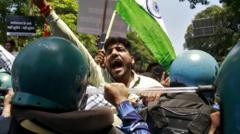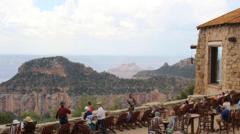The militant assault in Pahalgam, India, has triggered a reciprocal series of diplomatic and operational responses, with both countries intensifying their hostility.
**Escalating Tensions: Pakistan Halts Visas for Indians Amid Kashmir Attack Fallout**

**Escalating Tensions: Pakistan Halts Visas for Indians Amid Kashmir Attack Fallout**
In response to a deadly attack on tourists in Kashmir, Pakistan suspends all visas for Indian nationals and enacts severe countermeasures, straining the already fragile relationship between the two nations.
Following a tragic attack that claimed the lives of 26 tourists in Indian-administered Kashmir, Pakistan has issued immediate measures against India, including the suspension of all visas for Indian citizens. This response presents a significant escalation in tensions as Pakistan also expelled several Indian diplomats and closed its airspace to Indian flights.
Islamabad dismissed allegations linking the violence to Pakistani actors, reiterating that credible investigations had not substantiated India's claims. The assault occurred in Pahalgam, a popular tourist spot in the contested Himalayan territory. Indian authorities have identified three alleged gunmen in the shooting, asserting their ties to the Pakistan-based militant group Lashkar-e-Taiba (LeT), though none have confirmed these accusations.
Responding to the attack, Indian Prime Minister Narendra Modi vowed to track down those responsible, stating that the "spirit of India will never be broken by terrorism." In light of the attack, Delhi has implemented a suite of diplomatic measures, including the closure of the Attari-Wagah border and the cancellation of visa services for Pakistani nationals.
In retaliation, Pakistan rejected India's termination of the Indus Water Treaty, warning that any obstruction of this vital resource would be regarded as an act of war. The country has also restricted its diplomatic presence in India, compelling Indian military advisors in Pakistan to depart by the end of April.
As investigations continue, approximately 1,500 individuals in Kashmir have been detained for questioning related to the attack. Public sentiment remains heightened, particularly as businesses and schools in the region attempt to return to normalcy. However, reports have surfaced indicating that Kashmiri students studying in India face harassment in the wake of the incident.
The families of those who perished, including an Indian naval officer, a tourist guide, and a businessman on holiday with his family, are experiencing immense grief as their loved ones are laid to rest amidst an atmosphere of anguish and societal disruption.



















